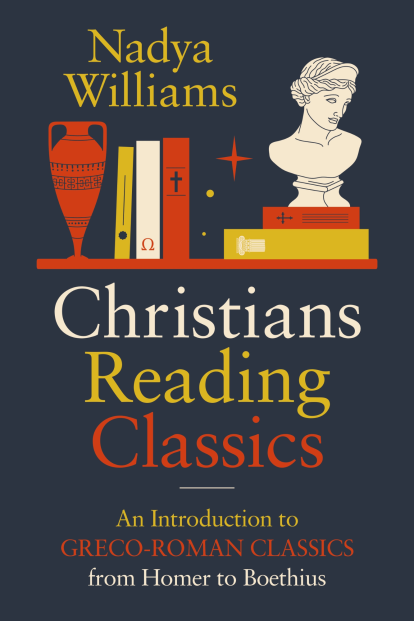Can Christians today read the great classics of Greco-Roman pagan literature for spiritual formation and growth in the virtues?
Classical scholar Nadya Williams responds with an unequivocal "Yes!" Even in the Late Roman Empire Christian readers, like Augustine and Boethius, did just this. But reading the classics this way requires reading differently than, perhaps, most people today are used to doing.
This is a book about reading the Greco-Roman classics as Christians--the why, the how, and to a lesser extent, the when. This exercise, equal parts intellectual and spiritual, is timely. Just as our bodies are what we eat, so are our minds what we consume. The past few years have seen the appearance of books on the value of literature in nourishing our minds and souls--developing the practice of reading not just the Bible but all that we read for spiritual formation. Most such books have focused largely on medieval and modern literature, involving antiquity only occasionally.
Almost two thousand years ago, as Christianity was first beginning to spread in the Ancient Mediterranean world, the gospel came to believers who had grown up hearing and reading the great works of pagan literature and seeing the pagan gods everywhere around in their world, saturated as it was with pagan gods in literature, public and private art, coins, and more. The joy in encountering Jesus and learning of his love for all sinful humanity, stood out particularly starkly against the cruelty of the pagan worldview that comes through so clearly in the myths. And yet, they too could see hints of truth and spiritual longings for salvation in those myths.
In twenty short chapters, Nadya Williams introduces the readers to one or two different ancient authors and their key works. She offers three interrelated reasons for Christians today to read the pagan classics for spiritual formation: reading to be surprised by joy, reading to understand the world of the Bible and the earliest Christians, and reading for character formation.
It is time Christians rediscovered the benefits of reading the great works of Greco-Roman classical literature as Christians.

Pre-order Bonus
Pre-order now and get early access to exclusive resources for teaching or studying.
Endorsements
Jessica Hooten Wilson (Fletcher Jones Chair of Great Books, Pepperdine University): Nadya Williams is my trusted teacher when it comes to the classical world. For Christians who long to know the classical world that preceded and paralleled their Scriptures, her introduction should be the primary resource. Not only a classics expert, but also Williams is a devoted Christian and engaging writer. She makes the classical world sing for contemporary readers!
Jeff Bilbro (Professor of English at Grove City College and editor-in-chief at Front Porch Republic): Nadya Williams is a discerning guide to the Greco-Roman classics, showing us not just that Christians should read these authors but how we should do so. Appreciative and critical, she calls attention to the unresolved tensions and shortcomings in these works as well as to the proleptic glimpses they give us of the gospel. Neophytes and seasoned readers alike will find great riches in the Egyptian gold that Williams recovers in this delightful book.
Dr. Marvin Olasky (Christianity Today executive editor for news and global): Many classical Christian schools help children sail smoothly but leave parents swirling between the Scylla of embarrassing ignorance and the Charybdis of preachy didacticism. Nadya Williams gives those without classical education the right amount of background to address intelligent questions to inquiring minds.
Timothy Larsen (McManis Professor of Christian Thought, Wheaton College): Every follower of Jesus Christ who is considering reading ancient Greek or Roman literature should read this wise, learned, and faithful book.Christians Reading Classics educates, edifies, and entertains. It is not only ideal for classic Christian schools and for homeschooling, it turned out to be ideal for me as well. Nadya Williams is the faithful guide I have been waiting for. I needed this book more than I knew.
John Dickson (author, historian, Jean Kvamme Distinguished Professor of Biblical Studies and Public Christianity, Wheaton College): What a gift Nadya Williams has given us! This is not only a masterful introduction to the Greek and Roman classics—worth reading for that alone—but also a compelling account of how Christianity wrestled with, challenged, and ultimately fulfilled the deepest longings of the classical world. Believers and skeptics alike will be enriched by this remarkable book. I wish I had read it twenty years ago!
SJ Murray, Professor of Great Texts at Baylor University, Founder of The Greats Story Lab: Hospitable and beautifully written, this book reminds us why ancient texts still speak to the soul. Nadya Williams offers not just a guide, but a kind of spiritual friendship across time.”
Soren Schwab, Vice President of Partnerships, Classic Learning Test: Nadya Williams’ book brilliantly demonstrates how Christians can engage with Greco-Roman classics for spiritual growth, offering a fresh perspective on ancient texts through a Christian lens. With insightful analysis and practical guidance, she reveals how these works can spark joy, deepen biblical understanding, and foster virtue, just as they did for early believers like Augustine. I recommend this book for anyone seeking to enrich their faith through the wisdom of antiquity.
Table of Contents
Timeline of Writers and Works
Introduction: Why Should Christians Read the Greco-Roman
Classics?
Part I: Longing for Eternity
1. Homer and Glory Before the Foundation of the World
2. Hesiod and the Quest for the Meaning of Life
3. Pindar and Seeking Eternal Glory Through Athletics
4. Herodotus, Thucydides, and Writing Eternity in Prose
Part II: The Formation of Virtuous Citizens
5. Aeschylus and the Formation of Virtuous Citizens
6. Sophocles Plays Clue
7. Aristophanes and Euripides Remember the Ladies
8. Plato and Aristotle Teach Civics
Part III: Words of Power and the Power of Words
9. The Athenian Forensic Speechwriters
10. How to Do Anything in the Ancient World
11. Cicero, Caesar, and Political Rhetoric in the Roman Republic
12. Ovid and the Rhetoric of Love
Part IV: Heroes and Role Models
13. Cato, Livy, and Exemplarity in the Roman Republic
14. Vergil’s Exemplary Romans
15. Tacitus on How to Be a Good Man Under a Bad Emperor
16. Suetonius, Plutarch, and the Emperor’s New Groove
Part V: Virtues and Vices in the Age of Anxiety
17. Apuleius and Marcus Aurelius Consider the Soul
18. Three North African Converts Read the Pagan Classics
19. The Christian Vergil’s Violent Virtues
20. Boethius and the Consolation Philosophy Gives
Conclusion: The Virtues of Rereading
About the Author

Nadya Williams
Nadya Williams received her PhD in Classics from Princeton University. She is the author of many books, a regular contributor to publications like Christianity Today, Providence Magazine, and Religion & Liberty, and is the books editor for Mere Orthodoxy, where she hosts the Christians Reading Classics podcast.
